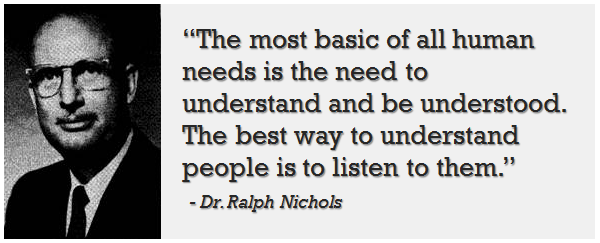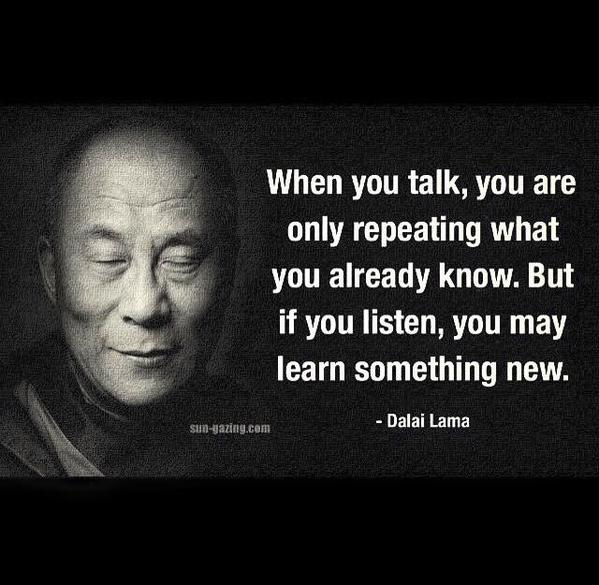Counselling is the major part of what we do but The Cambridge Counsellor isn’t just that.
For some time now we’ve been working with commercial and third sector organisations training their staff on how to improve their listening skills. Often overlooked in training programs it can be one of the most important parts of creating a harmonious, successful team.
If we’re not listening to what people are saying then how can we hope to understand them?
Good listening skills are vital for good leadership and are single handily one of the best ways to motivate employees.
Learning to become a good listener will quickly improve your professional and personal relationships more than anything else.

Motivating employees = Listening to them.
Just think about it, if you value someone then you listen to them. What better way to show people that you value them and the contribution they make than to show them that you’re listening to them.
It is very common to see managers dominating conversations. They’re in the position of power so they do most of the talking. When someone tries to make a point they either cut them short or override them simply because their position means they can.
What is really happening in these situations? Not giving your full attention to an employee when they’re talking you’re saying “you are valueless and unimportant”.
Carry this on for long enough and you will create a negative workplace where people feel unhappy and disaffected.
Value Your Staff
Often managers see meetings as an opportunity to inform everybody about their brilliant new ideas. They don’t give people the chance to express their views and so eventually they stop trying to.
This is wasting your most valuable asset, your staff. They are the ones doing their jobs, they are the professionals with experience at the coalface.
Not listening to their opinions is hindering as opposed to promoting progress. Worst still it will de-motivate them and make them feel like you don’t think they’re worth listening to.

Good Managers Listen
The best managers know how to listen!
When someone else is speaking they put their own stuff to one side. They smile, they nod and they encourage them to express themselves fully. They explore what they’re saying through the use of open questioning and they praise and compliment them when they mention their achievements.
If you want to motivate your staff then you need to be practising effective listening.
By listening, and more importantly showing your listening, you will encourage your staff to share their experiences and ideas with you. You will energise them, show them that they are valued and leave them eager to do a good job for you.
Every manager we have trained has reported that they have seen significant increases in morale, motivation and energy in their staff members simply through applying effective listening skills. They are some of the easiest skills to implement yet they are also amongst the most effective.
So what is the magic ingredient when it comes to listening? Ultimately there are four key aspects and they have always remained constant. You can read as much as you like on the subject but in the end you will always be left with these four key areas:
Attentive Listening
Non-verbal communication is the key. Face the speaker directly, lean forward, nod, be agreeable and most of all smile. When someone makes a point and you smile and nod you are giving them encouragement to speak more and to expand on their thoughts.
At first you are going to be very conscious that you are using effective listening skills but as you start to notice the positive effects it has on the people speaking to you, you’ll find it starts to become just a normal pattern of behaviour.

Pause Before You Reply
How often do people truly listen? I would suggest not much at all unfortunately.
Most of the time the person “listening” is actually having their own little conversation in their head, thinking about what they are going to say next and waiting for a moment to jump in and give their opinion. This isn’t listening, it’s just verbal tennis and it leaves both parties feeling dissatisfied.
Try something different. Get into the habit of pausing when the other person finishes speaking. Give it three to five seconds, or even longer if you can see the speaker is mulling things over silently.
You will instantly start to realise you get the following clear benefits:
The speaker becomes aware that you are actually taking the time to consider what it is they just said. In itself this tells them that you are taking them seriously and that you value their words, opinions, and most importantly, them as a person.
You are considerably less likely to interrupt the speaker when all they were doing was pausing for breath or gathering their thoughts. There are few things more irritating than being interrupted just as you’re getting your point across.
By giving yourself a brief gap to absorb what the speaker has said you are actually hearing them at a deeper level. You understand what it is they are trying to get across and you are more likely to gleam valuable information from them.
Clarification Means Questioning
Whereas before you may have jumped in and given your opinion, instead sit back, take a breath and ask a targeted question.
Questions such as “can you explain further?” and “that’s great, can you tell me more?” show your speaker you are listening to them and that you are interested in their point of view.
Effective listening promotes trust and therefore the more you listen to your staff the more they will in turn put their trust in you.
Reflect It Back
This is the key to all effective listening. When you use your own words to briefly summarise what the speaker has said you are showing them that you have genuinely been listening to them.
A lot of the time managers will smile and nod but then move straight on to their own thoughts on the matter. If you are able to reflect back what the speaker has just said you will soon start to hear those magic words “yes that’s exactly what I meant”.
Now you have a happy member of staff who feels that their opinions are valued and worth listening to.
The No1 tool in a manager’s armoury is making your staff feel important and valued. It’s the best piece of motivation you can offer them and you will quickly see evidence of it.
Once you master the ability to effectively listen to everybody within your organisation then you will have truly become an outstanding manager. The results will quickly mount up and you will be surrounded by a much happier workforce.

The Cambridge Counsellor offers listening skills training throughout East Anglia.
If you would like more information on how we can make your organisation a happier, more successful environment then please take a look at our Effective Listening Skills courses.
